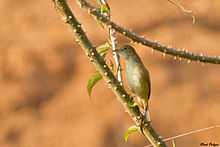Thick-billed warbler
| Thick-billed warbler | |
|---|---|
 | |
| Conservation status | |
| Scientific classification | |
| Kingdom: | Animalia |
| Phylum: | Chordata |
| Class: | Aves |
| Order: | Passeriformes |
| Superfamily: | Sylvioidea |
| Family: | Acrocephalidae |
| Genus: | Iduna |
| Species: | I. aedon |
| Binomial name | |
| ''Iduna aedon (Pallas, 1776) | |
| Synonyms | |
| |
The thick-billed warbler (Iduna aedon) is an Old World warbler that breeds in temperate east Asia. It is migratory, wintering in tropical south east Asia. It is a very rare vagrant to western Europe.
This passerine bird is a species found in dense vegetation such as reeds, bushes and thick undergrowth. 5-6 eggs are laid in a nest in a low tree.
This is a large warbler, at 16–17.5 centimetres (6.3–6.9 in) long nearly as big as great reed warbler. The adult has an unstreaked brown back and buff underparts, with few obvious distinctive plumage features. The forehead is rounded, and the bill is short and pointed. The sexes are identical, as with most warblers, but young birds are richer buff below. Like most warblers, it is insectivorous, but will take other small prey items.
The song is fast and loud, and similar to marsh warbler, with much mimicry and typically acrocephaline whistles added.
It was sometimes placed in the monotypic genus Phragmaticola (or Phragamaticola) and for a long time as Acrocephalus and in 2009 found to belong to the Iduna clade.[2]
References
- ↑ BirdLife International (2004). Acrocephalus aedon. 2006. IUCN Red List of Threatened Species. IUCN 2006. www.iucnredlist.org. Retrieved on 12 May 2006.
- ↑ Silke Fregin, Martin Haase,Urban Olsson,Per Alström (2009). "Multi-locus phylogeny of the family Acrocephalidae (Aves: Passeriformes) – The traditional taxonomy overthrown". Molecular Phylogenetics and Evolution 52 (3): 866–878. doi:10.1016/j.ympev.2009.04.006. PMID 19393746.
- Fregin, S., M. Haase, U. Olsson, and P. Alström. 2009. Multi-locus phylogeny of the family Acrocephalidae (Aves: Passeriformes) - the traditional taxonomy overthrown. Molecular Phylogenetics and Evolution 52: 866-878.
- Sangster, G., J.M. Collinson, P.-A. Crochet, A.G. Knox, D.T. Parkin, L. Svensson, and S.C. Votier. 2011. Taxonomic recommendations for British birds: seventh report. Ibis 153: 883-892.
